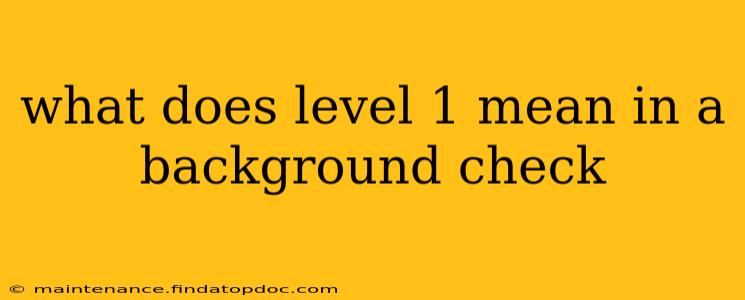A "Level 1 background check" isn't a standardized term across all industries or jurisdictions. The meaning varies greatly depending on the context – the specific company conducting the check, the industry, and even the country. There's no universally accepted definition. To understand what a Level 1 background check entails, you need to know who is performing the check and what their specific criteria are.
Instead of a "Level 1," background checks are usually categorized by the type and depth of information included. Let's explore some possibilities that might be associated with something labeled "Level 1":
Possible Interpretations of a "Level 1" Background Check:
1. Basic Information Check: This is the most likely interpretation. A Level 1 background check in this context might simply involve verifying basic information provided by the applicant, such as:
- Identity verification: Confirming the applicant's name, date of birth, Social Security number (in the US), and address using official records.
- Criminal record check (limited): Potentially a limited search of criminal databases within a specific geographic area or timeframe. This might only uncover felony convictions, or exclude certain minor offenses.
- Employment verification: Checking previous employment history, but perhaps only confirming dates of employment and job titles rather than obtaining detailed references.
2. Screening for Specific Issues: Some companies might use a tiered system where "Level 1" focuses on screening for particular concerns relevant to their industry. For example, in certain healthcare roles, a Level 1 check might focus solely on verifying licenses and certifications. In finance, it could focus on credit history or sanctions lists.
3. Internal Company Terminology: The term might be entirely specific to the organization conducting the check. Their internal documentation would need to define what "Level 1" means within their processes. Don't assume it has a consistent meaning across different employers.
What to Look For Instead of "Level 1":
Instead of relying on vague terms like "Level 1," look for details describing the contents of the background check. Key aspects to understand include:
- Criminal history search: Specify the scope – national, state, county, the types of offenses included (felonies, misdemeanors), and the timeframe covered.
- Employment verification: Is it a simple confirmation of dates of employment, or does it involve contacting previous employers for references?
- Education verification: Will they verify your degrees and certifications?
- Credit check: Will a credit report be pulled? (This is usually subject to consent.)
- Driving record check: Is this necessary for the position?
- Other checks: Depending on the job, checks for drug usage, professional licensing, or background in specific industries might be included.
Frequently Asked Questions:
What is the difference between a Level 1 and Level 2 background check?
There's no standard difference. The terms "Level 1" and "Level 2" lack universal meaning. The levels could represent increasingly comprehensive checks, but this would need to be defined by the company conducting the background check.
How long does a Level 1 background check take?
The timeframe depends entirely on the specifics of the check, the company conducting it, and how quickly they can access the relevant databases. It could range from a few days to several weeks.
How much does a Level 1 background check cost?
The cost again varies significantly based on the scope of the check.
What information is included in a Level 1 background check?
This is impossible to answer without more information about the specific background check being performed. The content is entirely dependent on the company's definition of "Level 1."
In conclusion, the term "Level 1 background check" is too vague. Always request clarification from the employer about precisely what information will be collected and how this information will be used. This ensures transparency and protects your rights.
